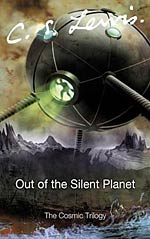
![]() couchtomoon
couchtomoon
8/8/2016
![]()
What is it about minorly stressful moments like get-togethers with family and sudden illness that make me want to curl up with 1930's pulp SF? I don't know, but it's not something I'm proud of. Perfect timing, though, because I'm due to read some C.S. Lewis and, not counting an aborted attempt at The Lion, the Witch, and the Wardrobe (1950) when I was twelve or so, this is my first C.S. Lewis novel. This Lewisian deficiency may have something to do with his well-known reputation as a Christian allegorist, of which, perhaps, Mom was aware and, striving to expose me to things outside our Southern Baptist church landscape, opted to omit Lewis from the bedtime reading repertoire. I dunno, I'll have to ask some time.
Inspired by the philosophical sci-fi writings of David Lindsay (A Voyage to Arcturus, 1920) (an author new to me and why haven't I heard of him?) and Olaf Stapledon (Star Maker, 1937), C.S. Lewis set out to write his own version of a metaphysical journey in space, yet doesn't come close to the transcendence he wishes to achieve. Where Stapledon expands on humanity's place and purpose within the infinite bounds of the cosmos, Lewis' effort is limited to the parameters of a constrained and commonplace worldview, resulting in a mere cosmic contrivance, like so many other space tales.
From the beginning, reminiscent of so many before him, (perhaps the worst offender being Wells himself, though Verne and Shelley, yes, even Shelley, come to mind) many pages are spent in contriving and justifying the situation in which our good man Ransom (get it, he's held against his will in the battle between, well, you know) finds himself on a spaceship rocketing to Mars, though the actual destiny is unknown to him at first, and is actually called Malacandra by its inhabitants, which sounds to me like a severe case of illness anxiety and/or a diseased organelle. I am overcome by the malacandras. (It's even stranger that this word processor recognizes the word. Malacandra. No red squiggle. Hmm.)
There is a good deal of tension alluded between Ransom and his two kidnappers/shipmates as they hurtle through space, but it's contrived only for the sake of Lewis' attempt to pit science and religion against one another, though the tension is neither palpable nor effective. It gets good when we finally get a tour of Malacandra, and this is where I could happily settle without plot or superficial Christian platitudes, just to look around at the lush vegetation that fans the air in ways that "seemed to need water to support them," (51) and "sheets of dazzling blue soda-water, and acres of rose-red soapsuds" (51) -- the color, not an illusion as on Earth, but true to its physiology. Some readers may get bored with all this sightseeing -- I normally do -- but Lewis' Mars is beautiful, his prose light and bright and not bogged down by too many adjectives as he warns us that "you cannot see things till you know roughly what they are" (47). It's "a world lighter than the Earth, where less strength was needed and nature was set free to follow her skyward impulse," (55) already hinting at the moral superiority of this unfallen world of space angels and benevolent creators and all that. So now the fun's over and so soon.
Getting to the people, the hnau, (and this is one of those books self-absorbed with its own lexicon -- oh joy!) I can't shake the feeling of an Inkling signature at details like the pfifltriggi who "delight in digging" and "soften [things] with fire," and the gangly, giant sorn who bring to mind the Ents. Though Tolkien's famous works were just barely coalescing into something more dense than just-published The Hobbit(1937) at this time, it seems likely that the seeds of these tropish-seeming characters were fermenting in letters and conversations among the Inkling writers, making it likely (and strangely compatible) that cross-contamination occurred between the English-speaking world's most beloved fantasy saga and one of its more neglected pulp-era space trilogies.
But more interesting to me than Lewis' friendship with Tolkien is Lewis' intellectual feud with Stapledon, which, from the little I have read about the "feud", I interpret as professional jealousy too close to cognitive dissonance to be a comfort to the either/or-thinking Lewis. His space trilogy seems to be a response to that dissonance, where he depicts this chaste planet full of people delighted with their own innocence and assigned roles, all buoyed by a benevolent ruler who knows exactly where Earth's humanity went wrong. It's a Christian fantasy, wrapped up in a kind of pseudo-Stapledon reverence, but this time for a western god. Lewis attempts to achieve something similar to the recently published Star Maker (and older Arcturus? I guess? Why have I not heard of this book?), but misses the magnificence of what an existing, powerful, impersonal universe can inspire. It just doesn't work when a benevolent ruler can explain everything. Like so many other sci-fi writers before and after him, Lewis doesn't get that didacticism is what kills the splendor of SF. (Case in point: Lewis dedicates pages to the whole "how I wound up in a spaceship while completely ignorant of its destination" situation, whereas Stapledon is like, "I just went the fuck outside and fucking mind-floated into space, and it was fucking incredible.") (I'm paraphrasing.)
Despite all that, it's a relatively enjoyable planetary setting to dally in, but its preoccupation with defining and delineating traditional morality makes it no different from any other western fantasy, fairy tale, or planetary romance.
http://couchtomoon.wordpress.com